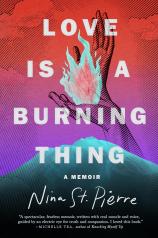Love Is a Burning Thing: A Memoir
Review
Love Is a Burning Thing: A Memoir
At the very start of LOVE IS A BURNING THING, Nina St. Pierre reminds her readers that a memoir is not an autobiography but instead “a curated work of memory.” Her memories, she explains, have been curated in order to answer the question that has haunted her: “What was happening with my mother, and why didn’t, or couldn’t, I understand?” While many memoirs center on reflection or even explanation, St. Pierre’s does indeed focus on an attempt to understand. In it, she tries to comprehend the mysteries of her mother, Anita, a loving and compelling yet deeply troubled woman, and come to terms with the guilt she feels for not understanding her better.
"LOVE IS A BURNING THING is so well written, fearlessly diving into such difficult and troubling events and memories, all the while honoring the subject with sensitivity, delicacy and narrative skill."
The burning in St. Pierre’s title is as physical as it is metaphorical. In 1971, 10 years before her daughter was born, Anita set herself on fire in the kitchen of an apartment along with a friend. The reasons for doing this have never been clear. It most likely was an attempt at suicide but with spiritual undercurrents. The other woman did not survive her injuries, though Anita, who also had stabbed herself, did. She was left physically disabled, but the mental causes, as well as the lingering trauma, for the act are what St. Pierre wrestled with as she tried to fathom her mother’s life.
St. Pierre’s childhood was semi-nomadic, and her time with her father was often in stark contrast to when she was with her mother, who had primary custody. Her parents were lifelong spiritual seekers, meeting through their interest in Transcendental Meditation. When they split, St. Pierre spent vacations with her father and his partner, meditating and vacationing. But her mother’s path was twistier and threaded with darkness. It was only as she grew older that St. Pierre began to recognize signs of her mother’s mental illness, including paranoia and auditory hallucinations.
In LOVE IS A BURNING THING, St. Pierre reckons with her mother’s health and how that impacted her and her younger brother, as well as what her mother may have experienced. The answers may leave her feeling a bit unsatisfied, still lacking clarity about Anita (and thus some aspects of herself), but the result is a moving tale of an intense woman who loved fiercely but was unable to keep her children --- or herself --- safe.
The 1971 self-immolation was not the only fire that directly impacted this family. There were two house fires that changed the trajectory of their lives and upended their security. Throughout the book, St. Pierre is able to use fire to examine and analyze, as well as to connect emotions, responses, fears and hopes.
Without a diagnosis or any mental health treatment plans on record, Nina St. Pierre has been left to sift through her memories, and the memories of others, to understand her mother and their complicated relationship. She also draws on a variety of sources --- some scientific, some religious, some pop culture, some artistic --- creating a collage of ideas and possibilities, questions and ruminations that give the reader much to consider and ponder.
LOVE IS A BURNING THING is so well written, fearlessly diving into such difficult and troubling events and memories, all the while honoring the subject with sensitivity, delicacy and narrative skill. It is a brave journey of self-help and self-resilience, and a fascinating look at the bonds of family and the power of expression.
Reviewed by Sarah Rachel Egelman on June 1, 2024
Love Is a Burning Thing: A Memoir
- Publication Date: May 7, 2024
- Genres: Memoir, Nonfiction
- Hardcover: 320 pages
- Publisher: Dutton
- ISBN-10: 0593473825
- ISBN-13: 9780593473825




